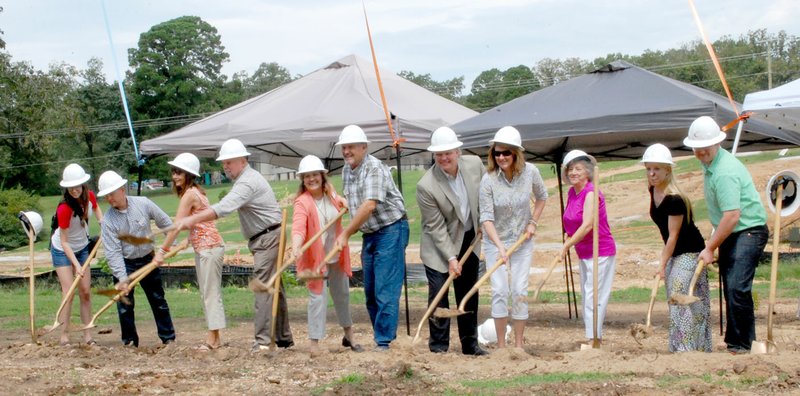Campers at Camp Siloam, a Baptist-affiliated camp located on South Lincoln Street, are one step closer to having a new dining hall to enjoy meals and each other. Staff members and guests gathered at the camp on Tuesday to celebrate the official groundbreaking that marked the beginning of construction for a 30,000-square-foot dining hall, large enough to fit a full contingent of campers.
The new dining hall will be able to hold 1,000 diners, which matches Camp Siloam's capacity, said camp director Jason Wilkie.
In 2010, Camp Siloam director Jason Wilkie met with a state health official inside the camp's dining hall.
"She said, 'you need a new dining hall,'" Wilkie said. "I said 'I know.' She said, 'well you guys have been talking about it for 12 years now.'"
The building isn't in better shape today, as some components keeping up the structure of the floor have failed, rot plagues much of the wood that makes up the rustic hall, and parts of a pair of walnut trees are inside the dining hall, raising health concerns.
Wilkie said the camp has had to work with the health department to keep its aging dining hall open, taking measures to limit contamination from the partially indoor trees and the wooden cooler in the back of the kitchen. Wilkie said the building dates back to when the land was owned by the Freemasons, and could be 100 years old.
Fast forward seven years from that health inspection, and Camp Siloam began construction this week on the much-needed dining hall. The groundbreaking comes as Camp Siloam's staff hopes to close out a $3.4 million fundraising campaign in the coming months. The campaign still has $735,000 to be raised.
"One of the main things is the ability to cook and serve people well," said Wilkie.
Wilkie said he hopes the new dining hall will help enhance the community feeling in camp by allowing campers to sit and eat for longer periods of time. The old dining hall could only accommodate 600 campers at once, and the expanded seating will allow all of the campers to sit and eat at the same time, instead of rushing through a food line in 15 minutes.
"And that's really one of our goals, one of our purposes is to really foster those conversations," Wilkie said. "What happens in the dining hall, that time spent sitting and visiting, thinking about the day, and talking about the Lord, those are all important things."
"Great relationships are really built on the ability to sit and visit," Wilkie said.
The larger hall and expanded seating capacity will allow the camp to hold mealtime programming and skits, and Wilkie said he also hopes to serve family-style meals at large round tables to bring campers closer together.
The construction of the new building is possible because of almost three years of fundraising. The current fundraising effort started in November 2014, after a previous effort was derailed by the banking collapse in 2008.
While Wilkie had some experience writing grant applications and overseeing large projects from his previous position in the Parks and Recreation Department for the city of Jonesboro, Ark., he had no experience fundraising for a church, so Camp Siloam hired the Hodge Group, from Ohio, to act as consultants. On their recommendation, Wilkie reduced the cost of the project from $6 million to $3.4 million and hired an office assistant to process gifts. The cost reduction was achieved by switching to cheaper materials and removing some more costly architectural features, Wilkie said.
The other major feedback from the Hodge Group was that the camp had a small donor-base that would make fundraising difficult.
"If this is going to happen, you're going to need a 'transformative gift', is what they called it, from outside of your donor base," Wilkie said.
That gift came from Charles Bonner, who made a donation of $1 million to the camp. Bonner made the donation because he remembered the revivals in Kentucky that started the baptist church camp movement, and had been looking to give to a worthy ministry.
"He thought, if this is what is happening at camp, if this is still happening at camp... this and the children's home were the two places he made a gift," Wilkie said.
General News on 08/27/2017
